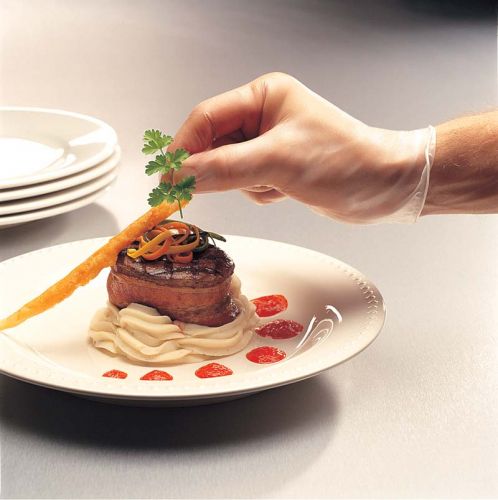At one of the first food safety conferences I attended was organized debate on whether glove use should be mandatory or not. That was 2002.
The discussion, also known as the bare hand contact allegory, pops up a few times a year. Right now it is Oregon’s turn. 
The U.S. Centers for Disease Control and Prevention and others have evidence that the U.S. Food and Drug Administration has used to support why keeping assumed-dirty hands off of food is a good idea. The simplified discourse is that food handlers are dirty; handwashing compliance is typically low; and, an easy way to take poor hygiene out of the mix is to legislate that hands can’t touch RTE foods — except this creates another compliance issue.
According to Eatocracy:
"Last year, when Oregon Health Authority officials announced they would adopt the 2009 FDA Retail Food Code, restaurateurs suddenly faced a piece of legislation that would prohibit foodservice workers to touch prepared food with their bare hands. The gloves came off.
Among the complaints raised by food experts: gloves give foodservice handlers a false sense of cleanliness, create more plastic waste (especially since plastic bags are banned in Oregon) and add a supplementary cost for restaurateurs.
"While the regulation is being put into place to prevent norovirus contamination, the bottom line is that gloves alone will not prevent the problem without being used in combination with hand washing," says Mindy Brashears, a professor of food safety at Texas Tech University.
Norovirus is what laymen more commonly refer to as food poisoning." (uh, sort of -ben)
The gloves or no gloves argument sometimes misses the point as Mindy Brashears alludes to- outbreak data shows that some food service operators and food handlers take short cuts, regardless of the local rules. It’s clear to me from the evidence that not touching food reduces risk. While many fast-food companies have figured out how to take hands out of the process (as well as food contact surfaces), what’s not clear is which of the paths (glove or no-glove) is easier to skip for all food businesses.
"Adam Sappington, the executive chef at The Country Cat Dinner House & Bar in Portland, regards the now-void ban as "crazy." "I got a little philosophical about the whole idea. It takes away one of the senses of cooking," he says. "It’s more likely that you’re going to wash your hands less, and moving from hot to cold, hot to cold in gloves, things are just going to fester."
See, it’s all about what system is less likely to be cheated.
Some folks have shown that compliance is low because the tools aren’t there or there isn’t enough time. Others have shown that food handlers may not know consequences. The more interesting discussion to me is how regs can affect the values of operators and food handlers. Whether gloves/tongs are required or not it, how to make commercial and volunteer food handlers value minimizing pathogen transfer is a bigger question.
